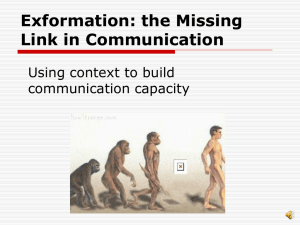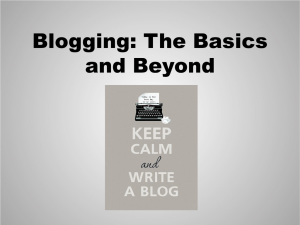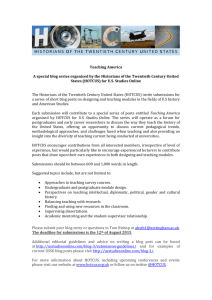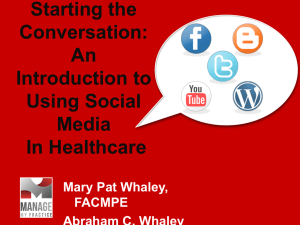PSYCHOLOGY 550a Proseminar in Human Behavior Fridays, 1:00
advertisement
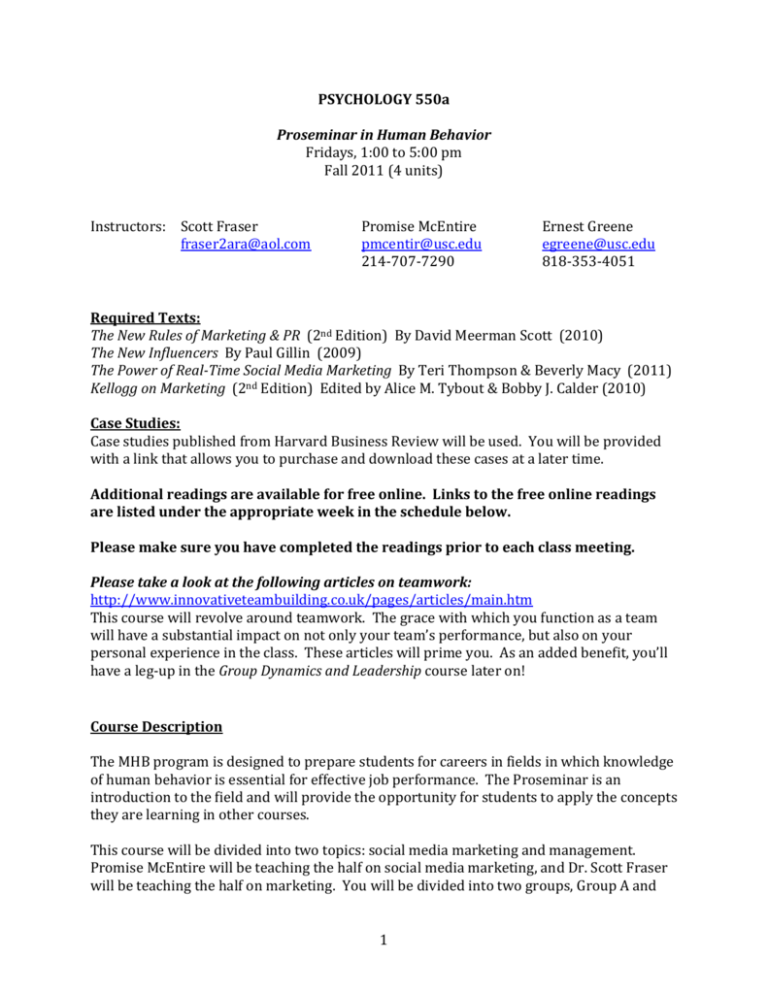
PSYCHOLOGY 550a Proseminar in Human Behavior Fridays, 1:00 to 5:00 pm Fall 2011 (4 units) Instructors: Scott Fraser fraser2ara@aol.com Promise McEntire pmcentir@usc.edu 214-707-7290 Ernest Greene egreene@usc.edu 818-353-4051 Required Texts: The New Rules of Marketing & PR (2nd Edition) By David Meerman Scott (2010) The New Influencers By Paul Gillin (2009) The Power of Real-Time Social Media Marketing By Teri Thompson & Beverly Macy (2011) Kellogg on Marketing (2nd Edition) Edited by Alice M. Tybout & Bobby J. Calder (2010) Case Studies: Case studies published from Harvard Business Review will be used. You will be provided with a link that allows you to purchase and download these cases at a later time. Additional readings are available for free online. Links to the free online readings are listed under the appropriate week in the schedule below. Please make sure you have completed the readings prior to each class meeting. Please take a look at the following articles on teamwork: http://www.innovativeteambuilding.co.uk/pages/articles/main.htm This course will revolve around teamwork. The grace with which you function as a team will have a substantial impact on not only your team’s performance, but also on your personal experience in the class. These articles will prime you. As an added benefit, you’ll have a leg-up in the Group Dynamics and Leadership course later on! Course Description The MHB program is designed to prepare students for careers in fields in which knowledge of human behavior is essential for effective job performance. The Proseminar is an introduction to the field and will provide the opportunity for students to apply the concepts they are learning in other courses. This course will be divided into two topics: social media marketing and management. Promise McEntire will be teaching the half on social media marketing, and Dr. Scott Fraser will be teaching the half on marketing. You will be divided into two groups, Group A and 1 Group B. From 1-3 p.m., one group will meet with one instructor while the other group meets with the other instructor (in separate locations). You will alternate topics every two weeks. From 3:30-4:50 p.m. each week the two groups will come together to hear a lecture provided by a senior professional. These executives, a number of whom might offer an internship to our qualified MHB students, represent various commercial enterprises. These individuals draw on real-world experiences in their successful business careers and thus provide insights that have practical value for every student in the MHB program. Some time will be reserved at the end of each talk so that speakers can provide personal career advice. You will be asked to provide a summary of what the speaker said, including three things you found most interesting, anything you didn't understand, and any requests for more information. Please refer to the course schedule for the exact dates, times, and locations of your sessions.1 Marketing (with Fraser) Some of the assigned reading are chapters in Kellogg on Marketing (by Alice Tybout & Bobby Calder). Other readings are provided by case studies drawn from the Harvard Business Publishing collection. These case studies can be purchased online as a bundle at: http://cb.hbsp.harvard.edu/cb/access/10014293. Note that it is a copyright infringement to share your copies with others, and we do not want the USC Administration targeting students or our program for this violation of the law. The textbook chapters and case studies cover basic principles of marketing as they are normally taught by business schools, and it is important to know these principles. However, a founding principle for the MHB program is that the major factor that determines success or failure in any commercial or non-commercial enterprise is the degree to which knowledge of human behavior has contributed to analysis and action. For the written and oral assignments described below, you will be asked to emphasize psychological and social concepts as a way to demonstrate the benefits of this expertise. Two chapters and three case studies will be assigned each week. You are expected to write a brief report (2-3 pages) for two of the case studies -- your choice -- and these are due at the beginning of the class session. The report should include references to at least one concept from the textbook that is especially pertinent to the case. If you cannot find a IMPORTANT NOTE: Due to field trips and other special events, the alternation of topics may not always follow the “A-BB-AA-BB…” format. PLEASE CHECK THE SCHEDULE WEEKLY TO ENSURE THAT YOU ARE PREPARED FOR AND ATTEND THE CORRECT SESSION; your teams will be depending on you! You also won’t want to miss any special events. 1 2 relevant concept in the assigned chapters, you may draw from another authoritative source, such as an article or another textbook. You should also propose a psychological principle, or more broadly, a social science principle, that contributes to a deeper, more complete understanding or plan for action. When a plan for action is deduced from the scientific principle being proposed, a brief description of a practical research design that an organization might employ could be proposed to illustrate the utility of understanding the principle. A majority of the period from 1:00-3:00 will be used for in-depth discussion of the case studies. You are expected to contribute 2-3 relevant insights to this discussion. One could discuss how the case illustrates or contradicts a major concept or process presented in the text readings for that week and/or how scientific principle of human behavior might be applied. Issues and concepts that are offered as part of discussion can come from your life experiences as well as insights that spring from your undergraduate and graduate coursework. You will find, however, that your arguments have more impact if you can cite authoritative sources, or better yet, research findings. Social Media Marketing (with McEntire) Description & Objectives “Social media has changed the world. It’s given a powerful voice to the consumer and fundamentally changed the way we communicate with each other and interact with brands. Tomorrow it will change again as social media continues to evolve. You need to stay ahead of the curve.”2 In this course you will learn how companies are leveraging the power of the social web to strengthen their brands. You will hear how companies are using social listening, measurement, and community engagement to build real relationships with customers and influencers. You will also get the chance to kick-start your career by planning and executing your own self-branding campaign. Learning Objectives: 1) Deconstruct biases regarding social media 2) Identify the cultural implications of social media 3) Compare social media tools and platforms and their usefulness for reaching relevant goals 4) Select topics and media most appropriate for influencing a given audience 5) Strategically plan and execute a social media marketing campaign in order to gain credibility in your field 6) Critique the effectiveness of a social media marketing campaign 2 Radian6, Social 2011 User Conference flyer 3 7) Distill a business problem and/or communications need down to its fundamental components and design a social strategy for meeting each need 8) Generate hypotheses about the effects of communications strategies and produce an action plan to delineate “next steps” 9) Use evidence-based persuasion 10) Implement techniques to enhance effective teamwork Course Format Discussions will be a function of everyone’s involvement. In most cases, the instructor will provide some opening remarks as a background for each unit. It is anticipated that these preliminary comments will evolve into a discussion of issues raised in the readings. Thus, it is essential that the assigned reading be completed prior to each class meeting. After the preliminary discussion, we will split up into teams. The class will be split into teams of four (teams are assigned, and you will be on the same team all semester), and each team will maintain a blog. Each team will “pitch” the class (sell them their blog concept for that week), ask for suggestions/feedback, and do a Q&A. Thus, teams should come to class prepared to present, with a detailed outline or draft of their post. As an audience member, you will be expected to help the presenters by providing suggestions and asking questions; this should be a class-wide brainstorming session - much like the ones that take place in creative agencies – intended to “get as many smart brains on the project as we can” (industry-speak), and yield the highest quality product. Don’t be shy! Each blog entry should relate – either directly or indirectly - to one of the following fields (a different field every week): 1) Advertising 2) Public Relations 3) Human Relations 4) Marketing & Market Research Your blogs will discuss real-world events, campaigns (advertising, PR, or political), management techniques, research methods, research studies, trends and their implications, educational formats, development, team performances, public reactions, technology, etc., etc. through the lens of commonly accepted psychological theory. Put another way, you should propose a psychological principle - or more broadly, a social science principle - that contributes to a deeper, more complete understanding of the real-world subject. You should also come up with an action plan/solution to improve the subject; if you think that the actors used their behavioral science well and that their methods were spot-on, you can simply explain – from a psychological standpoint – why what they did worked so well. These explanations will illustrate the utility of understanding the psychological underpinnings of the subject. The idea is that your blogs will not only give you practice in applying psychological principles to real-world problems, they will also function to brand you – as part of a larger self-branding campaign (more on this later) - as potential “secret 4 weapons” for employers in these fields.3 Aside from these conventions, teams will choose their own topics – this is your chance to get creative! After the pitches, teams will have the chance to process the feedback received and plan the posting. Occasionally, we will also take the time for teams to engage in “group processing” (discussing how well you’re achieving goals and maintaining effective working relationships, describing what member actions are helpful and unhelpful and making decisions about what behaviors to continue or change). We will use the last five minutes of the working session to debrief. You will write a quick assessment of the session (i.e., three things you learned, the thing you had the most trouble with, any comments on what's working for you and what isn't, or an answer to some question raised during the class). Methods of Evaluation (1) Team Blog Pitches (5) Pitches will be evaluated on the basis of adequate preparation, innovativeness of concept, and quality of presentation. Did you provide a concise (but complete) explanation of the subject? Did you pinpoint the fundamental problem or source of success and clearly explain the psychological underpinnings, with references when appropriate? Did you recommend a course of action and delineate your rationale? Did everyone on the team contribute equitably? (2) Team Blog Entries (5) Entries will be evaluated on the basis of quality of writing. Entries should be clear, focused, and concise. While the tone should be conversational, it should be professional enough to establish you as a voice of authority. Keep in mind the importance of search engine optimization (SEO), and be sure to include keywords your audience would use to find expertise on this topic. We will also ask you to suggest how your entry should be tagged. For example, if you write an entry about a failing football team with a slave-driving, namecalling coach and money-hungry, arrogant players who can’t seem to agree on who is responsible for what, you might tag it with human resources, management, team performance, conflict management, corruption, task cohesion, role confusion, attribution style, intrinsic affirmations, football, coaching, group dynamics, testosterone and statusseeking, etc. (I’m making this up. You will want to conduct some Google searches and visit the sites your audience is reading to determine what your keywords should be.) (3) Self-branding Campaigns & Presentations Over 95% of headhunters use social media to recruit new hires! We want to make sure you’re prepared. You will be asked to set up and maintain personal pages on the following platforms: Facebook, Twitter, LinkedIn, and Digg or any other content sharing site. These pages can be different from the ones you use socially, or they can be the same. Either way, you should construct your pages with a specific audience in mind: others in your field of interest. You Your posts will be featured on the MHB website. The MHB website will have four blogs, one devoted to each of the aforementioned professions. Your blog posts will be fed into the appropriate blog. You will, of course, be credited! 3 5 may even want to start adding friends/followers in your fields of interest. The goal is twofold: to establish your credibility in the field and to start networking. You should post at least one update and/or share per week on each platform (for a total of 15 updates/shares per platform over the course of the semester). At the end of the semester, you will be asked to share your pages and posting/sharing histories with the class and explain how your content appeals to your audience of interest. You should highlight particularly relevant and/or timely content in your presentation. Note that your individual blog (described below) will also be considered as part of your self-branding campaign. The individual blog itself is not graded in terms of quality here; here, the points for the blog will be given according to whether or not the blog entry builds on, or coincides with, the other content you posted on the other platforms that same week. We hope that you will be able to use the pages you begin in this class as a foundation for building your personal brand throughout your career! (4) Individual Blogs (15) Your individual blogs will follow the exact same conventions and guidelines as your team blogs, except that they’re all yours and you will focus only on the field you are interested in. This will give you the chance to build on past entries, design your own site, and really establish your personal brand. What you post on your blog should align with the image you’ve created on Facebook, Twitter, LinkedIn, and any other social sites. You are expected to post a minimum of once each week, as frequent updates are essential for being an effective blogger. If you would like to post more than once a week, your extra posts do not have to conform to the conventions and guidelines, but they should be relevant to your brand. We will also ask you to comment on at least one other student’s blog and one team’s blog each week. Grading4 Grades will be based on: Team Blog Pitches Team Blog Entries Individual Blogs Self-branding Campaigns Participation Total Points 50 50 60 60 10 230 Regarding your grade for PSYC 550a as a whole: Your grades from the two halves of 550a will be averaged to determine your final grade. Please note that your attendance is expected at 15 sessions, including the final. One goal of this practicum is to learn how to function effectively in teams. Thus, all members of a team will receive the same grade on team assignments. 4 6 Policies and Procedures • Attendance and Participation Participation, and therefore attendance, is expected. There will be many in-class activities and small group discussions that will help explain the material covered in class or lecture, and a large portion of Ms. McEntire’s half of the course will involve in-class teamwork. • Students with Disabilities Any student requesting academic accommodations based on a disability is required to register with Disability Services and Programs (DSP) each semester. A letter of verification for approved accommodations can be obtained from DSP. Please be sure the letter is delivered to me as early in the semester as possible. DSP is located in STU 301 and is open 8:30 a.m.–5:00 p.m., Monday through Friday. DSP can be reached at (213) 740-0776. • Statement on Academic Integrity USC seeks to maintain an optimal learning environment. General principles of academic honesty include the concept of respect for the intellectual property of others, the expectation that individual work will be submitted unless otherwise allowed by an instructor, and the obligations both to protect one’s own academic work from misuse by others as well as to avoid using another’s work as one’s own. All students are expected to understand and abide by these principles. Scampus, the Student Guidebook, contains the Student Conduct Code in Section 11.00, while the recommended sanctions are located in Appendix A: http://www.usc.edu/dept/publications/SCAMPUS/gov/. Students will be referred to the Office of Student Judicial Affairs and Community Standards for further review should there be any suspicion of academic dishonesty. The Review process can be found at http://www.usc.edu/student-affairs/SJACS/. Blog Policies Basically, this is what is expected of you: Make it clear that the views expressed in the blog are yours alone and do not necessarily represent the views of the Master’s in Human Behavior Program or the University of Southern California. Respect the MHB Program’s and the University’s confidentiality and proprietary information. Ask your instructor if you have any questions about what is appropriate to include in your blog. Be respectful to the University, the program, University employees, students, partners, and competitors. Understand when the MHB Program asks that topics not be discussed for confidentiality or legal compliance reasons. 7 Ensure that your blogging activity does not interfere with your attendance and participation in your classes. We don’t mean to turn you off from blogging by immediately inundating you with legalese, but we need to make clear our respective rights and responsibilities related to this activity. Because we intend to feature the blog content you produce as part of this course in association – via RSS technology - with the MHB Program, your content can only be featured subject to the terms and conditions of use (“Terms”) contained herein. By accessing, creating or contributing to any blogs associated with the MHB Program, you agree to abide by these Terms. Please read them carefully before posting to or creating any blog that will be associated the MHB Program. 1. Rights in the Content You Submit Default Creative Commons Public License Unless you specify otherwise, any and all works of authorship copyrightable by you and posted by you to any blog (“Content”) are submitted under the terms of an AttributionShareAlike Creative Commons Public License. Under this license, you permit anyone to copy, distribute, display and perform your Content, royalty-free, on the condition that they credit your authorship each time they do so. You also permit others to distribute derivative works of your Content, but only if they do so under the same Attribution-ShareAlike license that governs your original Content.5 Please read the full text of the Attribution-ShareAlike Creative Commons Public License. Amongst other things, this license permits RSS aggregators to copy, distribute, display and perform any Content on your blog that you syndicate using RSS. All Content on your blog is syndicated for RSS aggregation unless you change your settings to indicate otherwise. Option for More Restrictive License Terms If you prefer to offer your Content on more restrictive terms, you may do so as follows: - 5 For Content you submit to your own blog, remove the Creative Commons logo from your blog template (contact us if you require instructions). For Content you submit to a blog other than your own, label your submission with a full copyright notice, i.e., your name, the word “copyright” or symbol “©” and the year of first publication. Please note that this is common blogging etiquette. 8 By posting your Content using the Services, you are granting the MHB Program a nonexclusive, royalty-free, perpetual, and worldwide license to use your Content in connection with the operation of the Services, including, without limitation, the license rights to copy, distribute, transmit, publicly display, publicly perform, reproduce, edit, translate and reformat your Content, and/or to incorporate it into a collective work. Attribution When publicly displaying, publicly performing, reproducing or distributing copies of your Content, or Content as incorporated into a collective work, Harvard will make best efforts to credit your authorship. You grant Harvard permission to use your name for such attribution purposes. You, likewise, agree to represent yourself accurately. You acknowledge that misrepresentation may lead us, in our sole discretion, to cancel your use of the Services and delete any of your Content. 2. Conduct Posting We believe deeply in free speech. Given our role in coordinating these assignments and our presence together as part of the extended university community, however, we must reserve the right to remove certain content that you may post. As a general matter, you may post content freely to your blog and to those of others, so long as the content is not illegal, obscene, defamatory, threatening, infringing of intellectual property rights, invasive of privacy or otherwise injurious or objectionable. You may not use the University of Southern California name to endorse or promote any product, opinion, cause or political candidate. Representation of your personal opinions as institutionally endorsed by the University or any of its Schools or organizations is strictly prohibited. By posting content to any blog, you warrant and represent that you either own or otherwise control all of the rights to that content, including, without limitation, all the rights necessary for you to provide, post, upload, input or submit the content, or that your use of the content is a protected fair use. You agree that you will not knowingly and with intent to defraud provide material and misleading false information. You represent and warrant also that the content you supply does not violate these Terms, and that you will indemnify and hold the University harmless for any and all claims resulting from content you supply. You acknowledge that the University does not pre-screen or regularly review posted content, but that it shall have the right to remove in its sole discretion any content that it 9 considers to violate these Terms or the terms of any other campus user agreements that may govern your use of the campus networks. Accessing You understand that all content syndicated on the MHB website is the sole responsibility of the individual who originally posted the content. You understand, also, that all opinions expressed by users of this site are expressed strictly in their individual capacities, and not as representatives of any University institution. You agree that the University will not be liable, under any circumstances and in any way, for any errors or omissions, loss or damage of any kind incurred as a result of use of any content posted on this site. You agree that you must evaluate and bear all risks associated with the use of any content, including any reliance on the accuracy, completeness, or usefulness of such content. Children Collecting personal information from children under the age of 13 is prohibited. No Content should be directed toward such children either. 3. Disclaimer of Warranties and Limitation of Liability The University makes no representations or warranties of any kind - express or implied as to any blogging site’s operation or the information, content or materials included on these sites. You expressly agree that you use these sites solely at your own risk. 4. Modification of These Terms of Use The University reserves the right to change, at any time, at our sole discretion, the Terms under which our syndication services are offered. You are responsible for regularly reviewing these Terms. Your continued use of the syndication services constitutes your agreement to all such Terms. 5. Copyright Complaints The University respects the intellectual property of others, and requires that our users do the same. If you believe that your work has been copied and is accessible on this site in a way that constitutes copyright infringement, or that your intellectual property rights have been otherwise violated, you are encouraged to file a report. 10 PSYC 550a Suggestion Box An e-suggestion box has been set up for you in the form of a Gmail account. This account was set up to provide a place where students can make anonymous suggestions regarding their instruction and the material used in Promise McEntire's half of the PSYC 550 course. Please weigh in whenever you feel compelled to do so. Suggestions might include the following, in addition to any other area of concern you may have: - What isn't working for you? What is working? What would you like to see more of? Do you have suggestions for speakers? Additional material? Field trips? Is there another, better way to use this suggestion box? To make a suggestion, simply log in to this account using the following log-in information: username: MHBsuggestionbox@gmail.com password: suggestions Then just send an email to this very same account. Put the topic of your concern in the subject line, and try to keep suggestions about the same topic in the same conversation. (If a subsequent visitor wants to make another suggestion on the same topic, they can just hit "reply".) If you would like to send a private, anonymous comment directly to Ms. McEntire, you may use this account to send that email as well. Simply delete the message from the "sent" folder if you do not want your fellow students to see it. Please note that while the suggestion box will be checked regularly, it may not be checked for several days at a time. If there is a pressing concern, please be sure to email your instructor directly. We want to make sure that we are meeting your needs and providing you with the best experience possible. The more feedback you give us, the better equipped we'll be to make sure you're satisfied. 11



